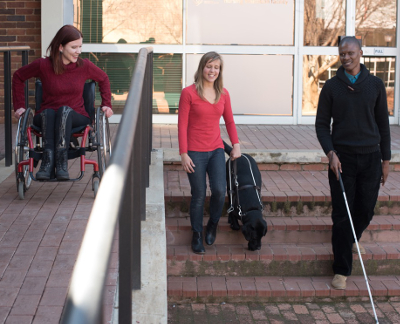 Lize Botha, Louzanne Coetzee and her guide-dog Oakley, and David Nkwenkwezi. Lize Botha, Louzanne Coetzee and her guide-dog Oakley, and David Nkwenkwezi.
Photo: Eye Poetry Photograpy |
The approach to support for students with disabilities at South African universities has remained largely one-dimensional, focusing on the support and accommodation of individual students. Implementing the Universal Access (UA) and Universal Design (UD) approach has aligned the University of the Free State (UFS) with international standards. Such an approach addresses challenges arising as a result of the interaction between functional limitations and the social, attitudinal and physical environment of students with disabilities. The Unit for Students with Disabilities (USD) has evolved into the Center for Universal Access and Disability Support (CUADS) in support of the social model of disability.
Hetsie Veitch, Head of CUADS and her team, have dedicated the past four years to the center’s physical revamping and systematic reconstruction to be officially launched in an Open Day event on the Bloemfontein Campus.
Details of the event:
Date: Friday 24 July 2015
Time:10:00-16:00
Venue: CUADS and Sasol Library foyer
Members of the public are welcome to attend.
Exploring the dimensions of UA and UD
UA and UD facilitate holistic support for students with visual, mobility, hearing, learning, and other impairments. With the former providing a paradigm shift in disability management and support, the latter warrants the formation of a universally accessible environment.
According to Veitch, the focus moves away from the person with the disability, someone who ‘needs to be helped’, to the environment in which that person needs to function.
Since the center was founded in 2001, structural and systematic developments have occurred in order to create a welcoming and accessible learning environment that grants students opportunities to be successful in their academic endeavours.
UA endorses the UFS Mission Statement of human togetherness, advancing social justice by creating multiple opportunities for students to access the university, and promoting innovation, distinctiveness, and leadership in both academic and human pursuits.The UFS is committed to be a welcoming, accessible, and inclusive learning institution, an environment where optimal learning for a diverse student community thrives.